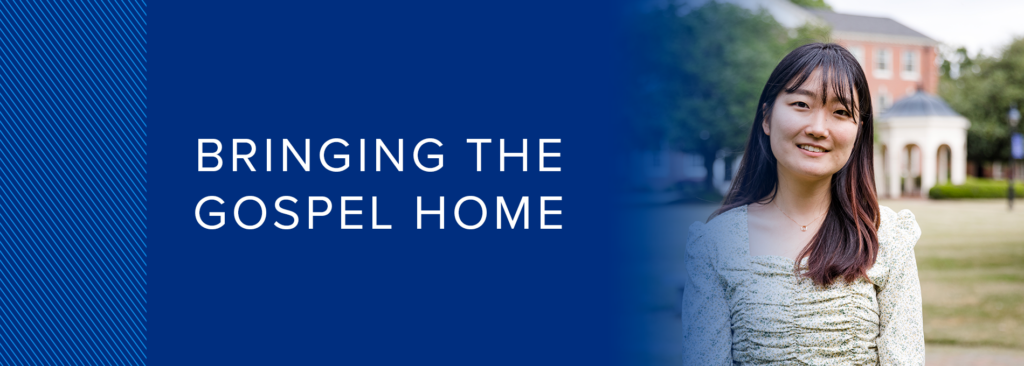Bringing the Gospel Home
Chad Burchett | January 10, 2024

As a Great Commission seminary, Southeastern is committed to equipping students to serve the Church and fulfill the Great Commission. One way this happens is by enabling students like Jiwon Mun to go on mission trips through its Center for Great Commission Studies.
In the following article, Jiwon shares how Southeastern equipped her to go on mission in her home country of South Korea.
In July’s scorching heat and high humidity, I went with a team from Southeastern Seminary to my home country of Korea. When my friends heard the news that I was going back to Korea for a mission trip, they all responded with curiosity: “Korea is no longer a mission field, so why are you coming to do missions here?” I had expected that response because many Christians in Korea don’t recognize Korea as a mission field. However, many professing Christians still hold syncretistic beliefs deeply influenced by Confucianism, and most of the younger generation of Koreans do not have any religious affiliation. These realities mean there are still many lost sheep in Korea. That’s why I was eager to return to Korea as a missionary.
During my first year at Southeastern, the greatest lesson I learned comes from Matthew 28:19 where Jesus gives his disciples the Great Commission to “go and make disciples.” I’ve learned that the Great Commission is about obeying his command and proclaiming his message regardless of where I am. I wanted to obey his command, so when I heard about the mission trip to Korea, I signed up to go.
I’ve learned that the Great Commission is about obeying his command and proclaiming his message regardless of where I am.
On this mission trip, I played the role of a “bridge” between the Korean locals and the mission team. As a Korean, I served as a channel of communication, helping my team understand and navigate Korean Christianity, culture, and language barriers. While the purpose of missions is undoubtedly to proclaim the gospel, I believe it is crucial to have a clear understanding of the target culture and your own cultural background. Having experienced both Korean and American cultures, it was a joy to serve the team as a cultural “ambassador” (on brand with our mission team coleader and rapper, the Ambassador, also known as Professor Duce Branch).
As is often the case on mission trips, we faced several bumps in the road. In Korean culture, people do not typically engage in small talk with strangers, and some locals are prejudiced against talking to strangers due to aggressive evangelism from Jehovah’s Witnesses and even sometimes Christians. As expected, we regularly encountered that reality; nevertheless, this opportunity led me to seek boldness from the Lord through daily morning devotions and a time of sharing with my team members. Through encouraging each other, praying together, and enjoying time together, we became united as a team with deeper confidence in the Lord. It was a blessing to feel united around a common purpose: glorifying God. This was my favorite part of this mission trip — being one in God’s word together.
This was my favorite part of this mission trip — being one in God’s word together.
During the second week of the mission trip, we moved to Jeju Island and helped lead a Christian youth camp. There, I had the opportunity to talk with teenagers and listen to their struggles. I could see their stress from living in a society focused on academics, their wounds that originated from their families, and their attempts to fill the lack of love received from parents with friendships and people’s attention. I could empathize with their pain because I had gone through similar experiences during my own teenage years.
When I thought about what I could do for them in such a short time of three days, I was reminded of God’s heart — the God who listens attentively to my words and understands me. By actively listening and sharing life with these teenagers, I got see them open their hearts toward me, and I had opportunities to share how God had worked through my life. I knew the only solution to their ultimate need was to realize that God is the only one who can give them unconditional love. This allowed me to pray for them with a compassionate heart, longing for them to experience God’s unconditional love.
This mission trip gave me an opportunity to rediscover the concept of “missions” — not only to focus on sharing the gospel but also to concentrate on knowing the person whom I share it with. The trip taught me to seek wisdom from God to enable me to engage with others, listen to their stories, and genuinely become interested in them. I realized that, despite being a native Korean, I still have much to learn about the state of Christianity in Korea. I also learned the importance of missionaries understanding the culture they plan to evangelize. I thank God for allowing me to be in an environment where I can experience firsthand what it means to be united as a mission team through God’s word and to pour out his compassionate heart on others.
Editor’s note: This article originally appeared in the fall 2023 issue of the Great Commission Magazine of Southeastern Baptist Theological Seminary.